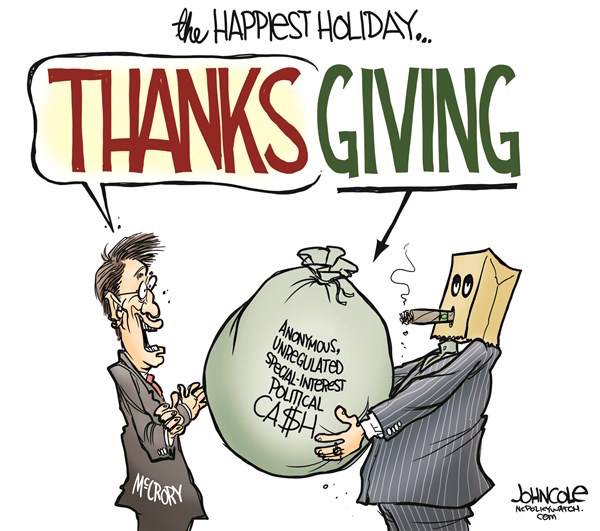Regulate Campaign Finance to Depolarize Politics
There Is Too Much Money in American Elections

American political campaigns at both the congressional and state levels are dominated by big money — large contributions and donations from a plethora of actors. The inherent problem with campaign financing is the clash of interest groups and their agendas. Most political donors — certainly the big ones — expect favorable policies in return for their generosity. A healthy future for a strong American democracy is one without the pervasive influence of money. As a matter of fact, the city of Seattle has taken drastic measures to do just that. In November 2015, city voters approved the nation’s first Democracy Voucher Program to encourage small private donations from individuals. We at UCSB’s CALPIRG, the California Public Interest Research Group, student run and funded, is working to bring this system to the City of Santa Barbara.
Several attempts have been made to regulate campaign financing in the United States. The Federal Election Campaign Act of 1971 represented one attempt, but a significant number of amendments to and major provisions in the Act have been struck down by the Supreme Court. The most recent occurred in 2010 in Citizens United v FEC when the Supreme Court affirmed that corporate personhood grants for-profit, nonprofit, and other associations the right to freedom of speech. This protection granted under the First Amendment allows some forms of political organizations to raise unlimited amounts of money and subsequently run political campaigns in favor of or against candidates running for office. In other words, the personhood of the corporation is expressing its opinion, which is protected under the First Amendment. Consequently, the number of so-called Political Action Committees (PACs) has increased dramatically since the landmark case in 2010.
The way money has infiltrated American politics stands in stark contrast to one of the most foundational principles of democracy: one person, one vote. The CALPIRG Democracy campaign is determined to find sustainable solutions and lobby for necessary reforms. We aim to spark concrete changes in campaign financing in Santa Barbara elections. To achieve this, CALPIRG has teamed up with several coalitions that are equally invested toward this goal. CALPIRG urges UCSB students and Santa Barbara residents to get involved.
Although financing caps might be the most obvious solution, this is a lengthy process. Rather, CALPIRG advocates that Santa Barbara follow Seattle’s example. That city’s Democracy Voucher Program gives each eligible Seattle citizen four vouchers worth $25 apiece. The individual is then free to give the vouchers to any city candidate as they wish. The program was voted in by Seattle’s taxpayers and is funded for the next 10 years through an annual property tax of $3 million. The Seattle Ethics and Elections Commission, which instituted the initiative in 2015, effectively made the democratic process for elections more transparent and more representative. This type of campaign financing regulation minimizes big money’s influence on the democratic process, putting individuals on equal footing in terms of their contributions.
With the support of other Santa Barbara organizations, CALPIRG is leading the charge to get elected officials to implement the same voucher system in Santa Barbara. The experiment in Seattle has produced positive results, and we believe this model is mature enough to be tested in Santa Barbara elections. CALPIRG is also working on campaign funding caps, which is a more complex process that will require more time.
There is too much money in American elections. In order for local democratic processes in America to stay healthy, measures such as these must be implemented. “The campaign finance scandal in America is the global warming of American political life,” Alec Baldwin has said. This is why more American cities should experiment with creative solutions like Seattle’s. Political activism always starts locally. For Santa Barbara, the time is now to follow Seattle’s lead and take big money out of politics.



